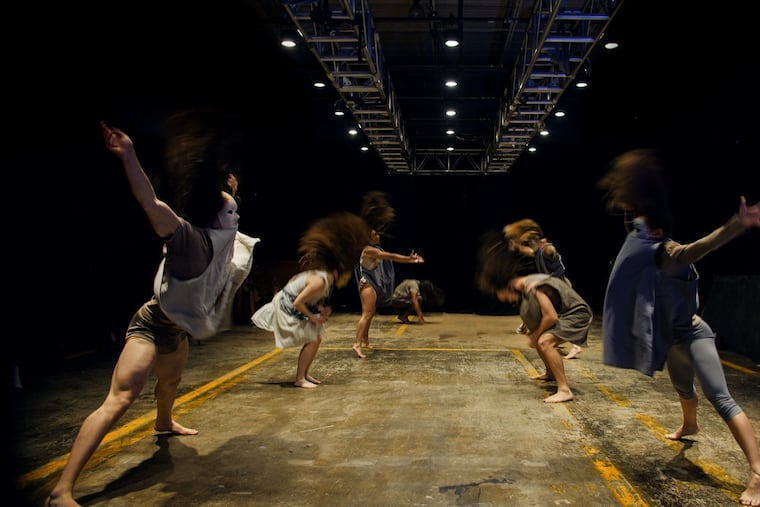Philadelphia Orchestra and Brian Sanders’ JUNK have teamed up again, for ‘Carmen’
With Rodion Shchedrin's suite on Bizet's themes, the collaboration between Philadelphia Orchestra and Brian Sanders' JUNK brings colorful new dimensions to familiar music.

When the Brian Sanders’ JUNK company first performed with the Philadelphia Orchestra a couple of years ago, they floated on air. Above the musicians — sometimes high above — the aerialist-dancers delivered the story of Romeo and Juliet with a certain sense of daring.
In their current collaboration with the orchestra, the JUNK troupe arrives much more earthbound. There is no high-wire suspense in this Digital Stage meeting of the minds over musical themes from Bizet’s Carmen.
In fact, the orchestra and JUNK members don’t actually meet very much at all in the new collaboration, presented online starting Thursday. Musicians and conductor Yannick Nézet-Séguin set down the score in Verizon Hall first, then the recording was played back in JUNK’s Northern Liberties studio, where the performers responded with their energetic brand of dancerly theatrics.
The two mostly-separate filmed artistic realizations were later intercut as if the forces were performing simultaneously.
With the decision to keep performers apart, made out of COVID-19 safety concerns, something was lost. The orchestra sat on a brightly lit stage, while the JUNK performers were off in what we are led to believe is some other darker, dangerously sexy backstage realm. There was little sense of collaboration or artistic interplay.
Still, the JUNK troupe gives viewers an eyeful. The broad contours of Carmen’s tale are there, set in a shadowy world of brooding facial expressions, mannequin-like masks, and subtle eroticism. The film comes with a warning about “adult themes,” an apparent reference to a dreamy, sensuous love-triangle scene and the violence of the story itself.
All of the artists, backstage and on, benefit from the razor’s-edge score by Rodion Shchedrin. Orchestrated for strings and percussion on themes taken from the Bizet opera and unveiled at the Bolshoi in 1967, the 13-movement Carmen Suite is a radical recasting originally meant to accompany dance. It seems absolutely appropriate to see it here extended to a genre one or two degrees farther on the crossover dial.
Neither Bizet nor Shchedrin could have imagined this music set to hoverboards, but the modern self-balancing scooter is key to one of the suite’s most magnetic scenes. In the opening dance, where the characters are being brought to life, dancers glide on the moving devices like so many automatons. It’s both beautiful and creepy, made all the more powerful by a (fairly) pure stretch of Bizet’s music.
And here we get a surprise. At the movement’s end comes a percussive slap, and if we didn’t consciously think of it already, we now fully realize how different this is going to be from the Bizet scorings to which we’ve grown accustomed over decades. Melodies get interrupted by zany pops of percussion, and tunes issue in novel colors. Shchedrin’s genius lies in clothing Bizet’s memorable material in both the pastel hues of feathery strings and the fluorescent glow of the vibraphone.
In safer times, Sanders and the orchestra might have come up with a different set of artistic responses. But circumstances are what they are. The tidy package of a COVID-sized orchestra, reality-bending score, and performers cloaked in theatrical masks spinning to dark tragedy seems about right.
The Philadelphia Orchestra’s Digital Stage program with Brian Sanders’ JUNK streams Thursday at 8 p.m. and is available through March 11 at 11 p.m. Tickets are $15 or $17. philorch.org.
The orchestra also has announced a free encore broadcast of its final live concert before the pandemic shutdown. The March 12, 2020, performance to an empty Verizon Hall of Beethoven’s Symphony Nos. 5 and 6 and Iman Habibi’s Jeder Baum spricht is led by Nézet-Séguin. It is available free, with registration, March 12-19. philorch.org/encore.